Here’s where the polls stand in some key 2022 Senate races
By Caroline Vakil
With the pathway to the Senate narrowed to a handful of battleground states, Republicans and Democrats are looking to polls to make sense of their odds of taking the majority in the upper chamber on Tuesday.
While polling hasn’t always been reflective of actual voter turnout and many of these races will likely not be called for days, polls have offered a snapshot of voter sentiment throughout the midterms and could hold some clues of what to expect in the coming days.
Here’s a look at recent polls in seven key races:
Nevada

Nevada Republican Senate candidate Adam Laxalt on Aug. 4, 2022, in Las Vegas, left, and Sen. Catherine Cortez Masto, D-Nev., on April 26, 2022, in Washington, right. (AP Photo/John Locher, left, Jacquelyn Martin)
Polls have mostly shown Republican Adam Laxalt with an edge over Sen. Catherine Cortez Masto (D) in the Nevada Senate race. RealClearPolitics’s polling average has Laxalt ahead 2.8 points, while a separate polling average from the data website FiveThirtyEight had the Republican up 1.4 points.
In polls where he has the advantage, Laxalt pulls ahead of Cortez Masto by anywhere from 2 to 6 percentage points. At the same time, several polls also show Cortez Masto leading Laxalt, but she’s generally between 1 and 2 percentage points ahead. There are a few factors at play in this state. For one, the economy has been seen as a top-of-mind issue for a plurality of voters given Nevada’s hospitality- and tourism-focused economy and how it was impacted during the COVID-19 pandemic restrictions. Its tourism and hospitality industries also present an added challenge to lawmakers, who must reintroduce themselves to voters given Nevada’s transient nature.
Arizona

Blake Masters (R) and Mark Kelly (D). (AP Photo/ Ross D. Franklin)
Sen. Mark Kelly (D) is likely favored to win reelection in the Arizona Senate race against Republican Blake Masters, as most public polling shows the former NASA astronaut ahead of the venture capitalist, though by narrow margins. A polling average from FiveThirtyEight shows Kelly ahead more than 1 point, while a separate polling average from RealClearPolitics shows Kelly up 1 point.
Most surveys show Kelly with a single-digit lead over Masters, though several recent polls have shown the two tied — and one even has Masters ahead of Kelly by a narrow margin. An Emerson College Polling survey conducted Oct. 30 through Nov. 1 reports Masters leading Kelly by a slim 1-point margin, 48 percent to 47 percent, among very likely voters.
It’s still too early to know what effect third-party candidate Marc Victor’s decision to drop out and endorse Masters will have on the race at this point, since Victor announced that well after early voting had started.
Wisconsin
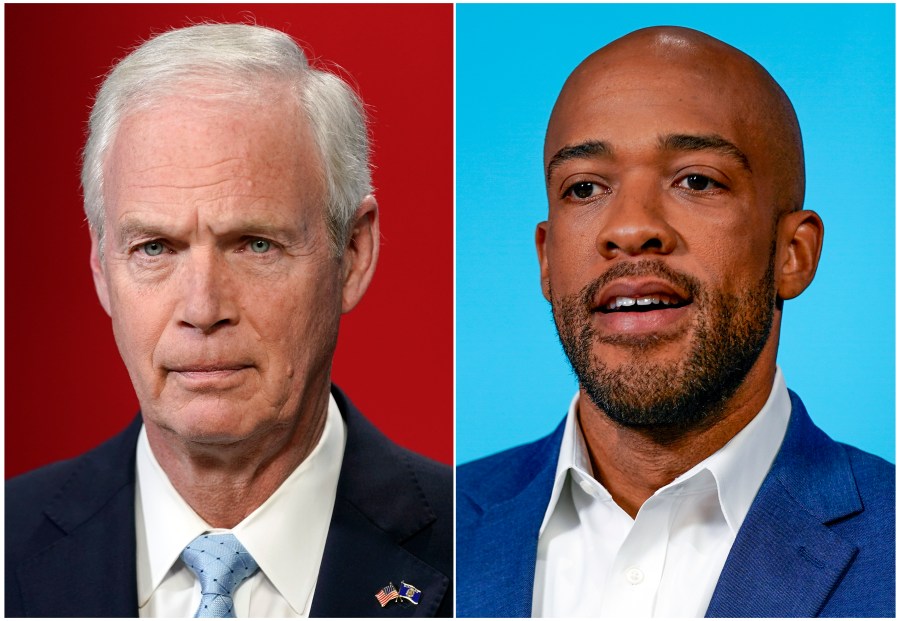
This combination of photos shows Sen. Ron Johnson, R-Wis., left, and Democratic Senate candidate and challenger Mandela Barnes before a televised debate on Oct. 7, 2022, in Milwaukee. (AP Photo/Morry Gash)
While Sen. Ron Johnson is seen as the most vulnerable Republican incumbent in the Senate, recent polls suggest that he will likely prevail for a third term. Polling averages from RealClearPolitics and FiveThirtyEight show Johnson ahead 2.8 points and 3.4 points, respectively.
Most recent polls show Johnson ahead between 1 and 6 points, and few recent polls show Democratic challenger Mandela Barnes leading Johnson. If they do, Barnes is up only 2 or 3 points — a different dynamic since August, for example, when some polls showed the state’s lieutenant governor enjoying an edge.
Jessica Taylor, an editor at the Cook Political Report, changed the nonpartisan election handicapper’s rating of the race from “toss up” to “lean Republican” earlier this month, given a slightly more favorable political environment. That’s not an unfamiliar forecast from other competitive Senate races that have since tightened after Democrats led their Republican challengers at various points in the summer.
Georgia
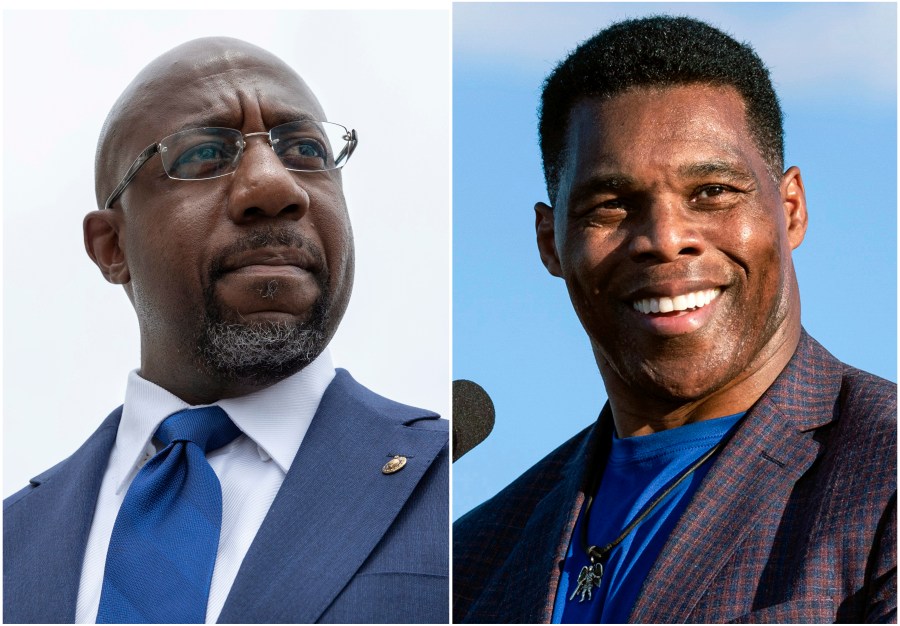
This combination of photos shows, Sen. Raphael Warnock, D-Ga., speaking to reporters on Capitol Hill in Washington, Aug. 3, 2021, left, and Republican Senate candidate Herschel Walker speaking in Perry, Ga., Sept. 25, 2021. (AP Photo)
While polls show Republican Herschel Walker with a slight edge over Sen. Raphael Warnock (D) in Georgia, it’s likely that the race will head to a runoff next month. Polling averages from FiveThirtyEight and RealClearPolitics show Walker up 1 point and 0.6 points, respectively.
When The Daily Beast reported in early October its first story alleging that Walker had asked a woman whom he had a relationship with at the time to get an abortion, polling afterward suggested that report and others that followed caused a temporary hit to his campaign. But given how quickly Republicans have coalesced around their candidate, polling suggests Walker still has a shot at the Senate.
RealClearPolitics projects the race will go into a Dec. 6 runoff, while FiveThirtyEight’s polling average shows Walker with an average of 47.7 percent support compared to Warnock’s 46.7 percent. One of those candidates would need to receive at least 50 percent support to avoid a second race.
Pennsylvania
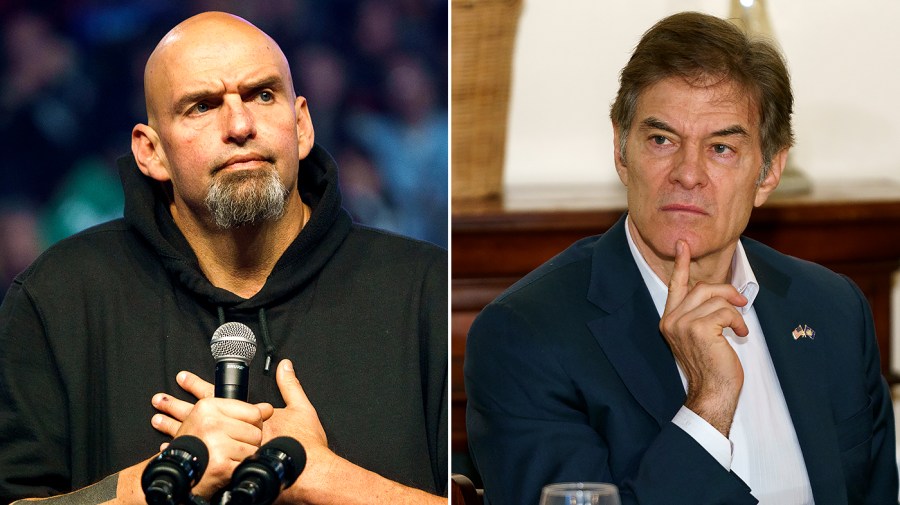
Pennsylvania Democratic candidate for Senate John Fetterman and Republican candidate Dr. Mehmet Oz. (Greg Nash)
Pennsylvania’s Senate race is considered Democrats’ best pickup opportunity, but the race has considerably tightened in recent weeks. Though Democrat John Fetterman enjoyed flattering polls over the summer and into the fall showing him leading Republican Mehmet Oz, the dynamic of his and many other Senate races have shifted as voters’ minds returned to issues like crime and the economy.
There were also questions about whether Fetterman’s debate performance last month against Oz would negatively affect the Democrat’s election chances. While several polls released since the debate have shown Oz ahead of Fetterman by between 1 and 3 points — including an Emerson College Polling-The Hill survey with Oz at 48 percent and Fetterman at 46 percent — it’s not clear how voters will weigh the debate, if at all.
Still, polling averages from RealClearPolitics and FiveThirtyEight show the race will be a dead heat. A polling average from RealClearPolitics shows Oz ahead at 0.1 point, while FiveThirtyEight has Fetterman ahead 0.1 point.
New Hampshire
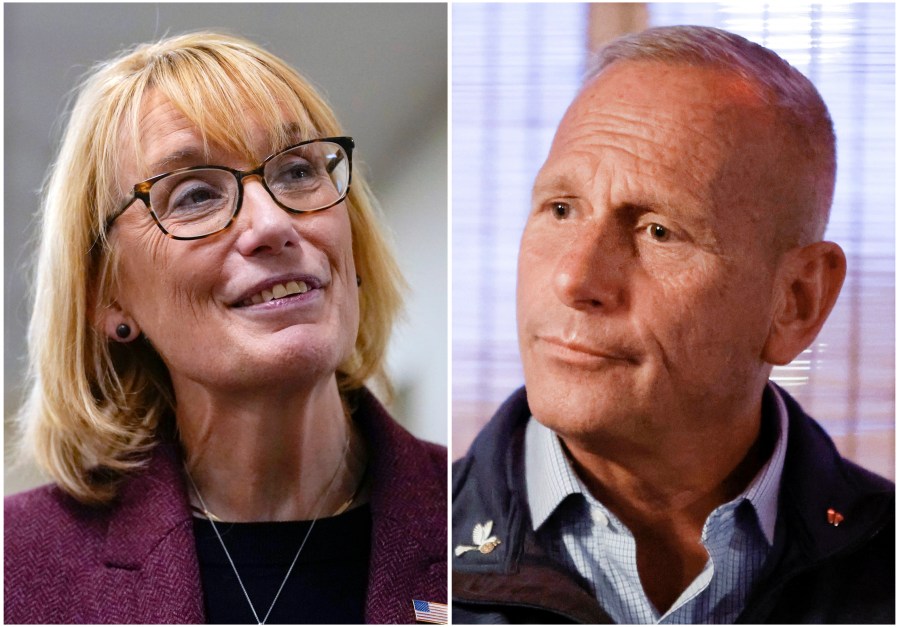
This combination of file photos shows Sen. Maggie Hassan, D-N.H., on Oct. 11, 2022, in Rochester, N.H., left, and Don Bolduc, Republican candidate for U.S. Senate in New Hampshire, Oct. 5, 2022, in Auburn, N.H. (AP Photo)
Before the September GOP Senate primary, some Republicans were ambivalent about how competitive the New Hampshire Senate race would be if retired Army Gen. Don Bolduc prevailed as the GOP nominee. Outside Republican spending poured into the state, only for several groups to reverse course as polls showed Sen. Maggie Hassan (D) maintaining a lead over Bolduc.
But the Senate GOP campaign arm reversed course again and decided to launch a seven-figure ad buy in the state. Still, only a couple of recent polls have shown Bolduc ahead — and mostly by 1 point — over Hassan. More polls have consistently put Hassan ahead of the Republican, though it’s still likely to be a close race.
A polling average from FiveThirtyEight has Hassan up 2 points, while one from RealClearPolitics has the senator up 1 point.
Ohio
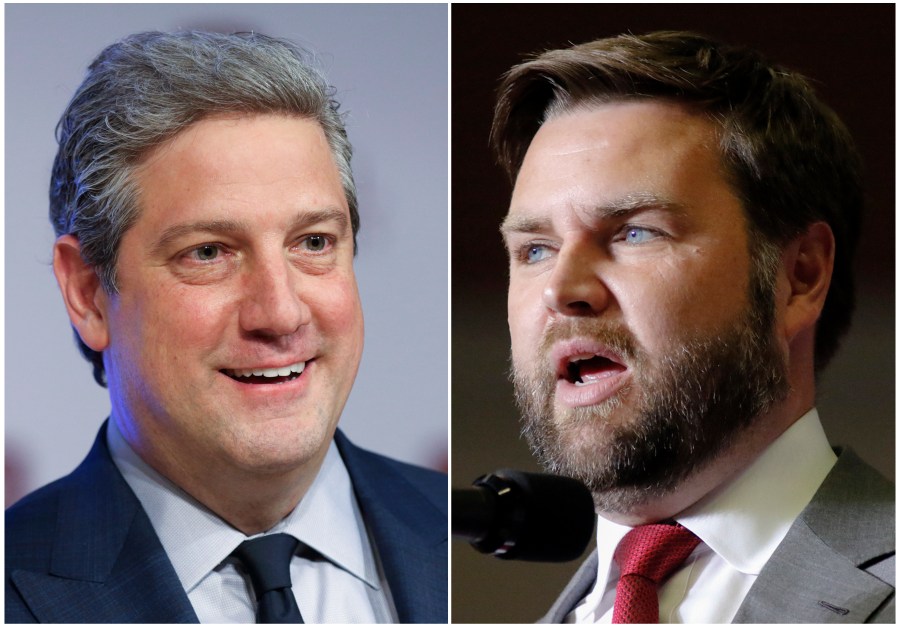
Ohio Democratic Senate candidate Rep. Tim Ryan, D-Ohio, on March 28, 2022, in Wilberforce, Ohio, left, and Republican candidate JD Vance on Sept. 17, 2022, in Youngstown, Ohio. (AP Photo/Paul Vernon)
Democrats have lauded Senate hopeful Tim Ryan’s (D) campaign in Ohio as the congressman has kept the race competitive against Republican J.D. Vance between the summer and the fall. And while Democrats believe this could be the year they elect a second Democrat to statewide office, polls are showing a better night for Vance.
For one, polling averages from FiveThirtyEight and RealClearPolitics show a much higher lead for a Republican in a competitive Senate race than the others mentioned here, with Vance ahead 5.4 points and 7.5 points, respectively. Some recent polling has suggested the Republican has even widened his lead.
An Emerson College Polling survey conducted from Oct. 30 to Nov. 1 showed Vance ahead of Ryan among very likely voters, 51 percent to 43 percent, compared to another Emerson College poll in October that had Vance and Ryan at 46 percent and 45 percent, respectively.
Copyright 2023 Nexstar Media Inc. All rights reserved. This material may not be published, broadcast, rewritten, or redistributed.


